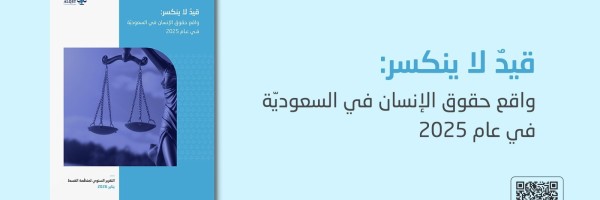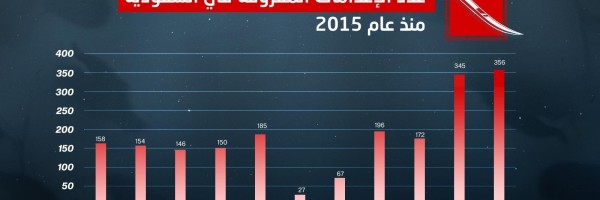لا تزال السلطات السعودية تمارس التعذيب في السجون وغرف التحقيق بشكل ممنهج رغم جميع التعهدات السعودية بإيقاف التعذيب، بل توسعت السلطات في استخدام التعذيب بشكل كبير منذ تولي الملك سلمان الحكم، وتولي ابنه محمد بن سلمان ولاية العهد، فازدادت أعداد الذين يتعرضون للتعذيب وتنوعت أنواع التعذيب في داخل السجون.
القسط في تقرير حول التعذيب نشرته في اليوم الدولي لمساندة ضحايا التعذيب لعام 2016، ذكرت فيه وقائع تبرهن على منهجية التعذيب وأمر بعض القضاة المحققين لتعذيب الضحايا، وذكر التقرير وعودًا للسلطات قدمتها للمجتمع الدولي بالحد من التعذيب، وقالت أنها تدرس التصديق على البروتوكول الاختياري لاتفاقية مناهضة التعذيب، ورفع تحفظها عن المادة (20) من الاتفاقية، إلا أن ذلك لم يحصل.
كما نشرت القسط تقريرًا عن تدهور الحالة الحقوقية بشكل أكبر في عهد الملك سلمان وتعرض التقرير لزيادة التعذيب، وفي تقريرها السنوي الأخير ذكرت القسط أسماء بعض من طالهم التعذيب من النشطاء والناشطات ومن بينهم الحقوقي الكبير الدكتور عبدالله الحامد الذي فقد حياته جراء التعذيب الذي طاله في السجون السعودية، وذكر التقرير أشكالًا من التعذيب كالصعق بالكهرباء والتعليق والحرمان من النوم والتعرية والتعريض للبرد والحرمان من الشمس لأشهر والتحرش الجنسي والتعذيب النفسي كالتهديد بالقتل أو بقتل الأقارب أو خداع الضحية بمعلومات كاذبة عن وفاة أو مقتل بعض أفراد أسرهم وغير ذلك، وذكرت في التقرير أسماء لعدد من ضحايا التعذيب وما تعرضوا له من تعذيب جسدي ونفسي، ومع هذا لم تقدم السلطات السعودية على فتح أي تحقيق في ذلك ولم تسمح لأيٍ من المنظمات الحقوقية ولا للمقررين الخاصين التابعين لمجلس حقوق الإنسان من زيارة السجون، واستمرت المحاكم السعودية في قبول الأقوال المنتزعة تحت التعذيب، ولا يزال عدد من ضحايا التعذيب خلف القضبان، ولا زالت السلطات تمارس التعذيب بشكل ممنهج وخاصة ضد الأشخاص الذين لم يعرف عنهم ولم تنشر قصصهم، وإن كانت السلطات قد أوقفت بعض أنواع التعذيب الوحشية ضد نشطاء انتشرت قصصهم حول العالم، إلا أنها لم توقف ضدهم أنواعا أخرى من التعذيب، فلا زالوا يعانون من الحرمان من الاتصال ومن النوم، ويتعرضون للتبريد وحرمانهم من الماء الساخن للاستحمام ومن أدوات النظافة ويوضعون فيما يعرف بالحراسات المشددة مقيدي الأيدي والأرجل، كما لا يزال التعذيب الوحشي والتحرش الجنسي مطبقًا على معتقلين آخرين.
وقد ذكر المقرر الأممي الخاص المعني بتعزيز وحماية حقوق الإنسان في سياق مكافحة الإرهاب بعد زيارته للسعودية عام 2017 أن: «عدم توفير المملكة العربية السعودية الحد الأدنى من الضمانات الإجرائية أثناء الاحتجاز والاستجواب، وممارستها القضائية المتمثلة في قبول الاعترافات المنتزعة بالإكراه كأدلة، يشير بقوة إلى أنها ممارسة تم إقرارها بشكل رسمي». وأشار إلى أن وجود ثلاثة آلاف شكوى مسجلة متعلقة بالتعذيب لم ترده حولها أي حالٌة حوكم فيها المسؤول المتهم يبين حجم الإفلات من العقوبة عند المسؤولين الحكوميين المتورطين بأعمال التعذيب.
تذكر القسط أن ما تقوم به السلطات من محاولة إصمات للمجتمع الدولي عبر وعود غير جادة بالإصلاح لا ينسجم تمامًا مع ممارساتها على الأرض، وتؤكد القسط أن ازدياد وتوسع استخدام التعذيب بهذا الشكل الممنهج والذي أفقد عددًا من المعتقلين حياتهم، وخرج بعضهم وهم يعانون أمراضًا عضوية ونفسية وعقلية، وفوق هذا الإفلات التام من العقوبة حتى لصغار المسؤولين، لدليل واضح وصريح على ما يردده من يمارس التعذيب بأن لديهم صلاحيات وأوامر عليا بالتعذيب، لذا تدعو القسط لتحميل السلطات المسؤولية كاملة عن التعذيب الجاري وكل نتائجه، وعدم الانسياق للوعود الرسمية، وممارسة الضغط على السلطات من أجل دفعها للتوقف عن هذه الممارسات، وتحريم التعذيب في الأنظمة والقوانين السعودية، وضمان توفر آليات التقاضي للضحايا، وضمان عدم إفلات المسؤولين من العقاب.




